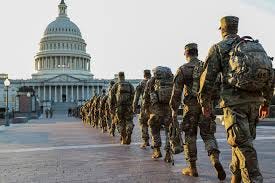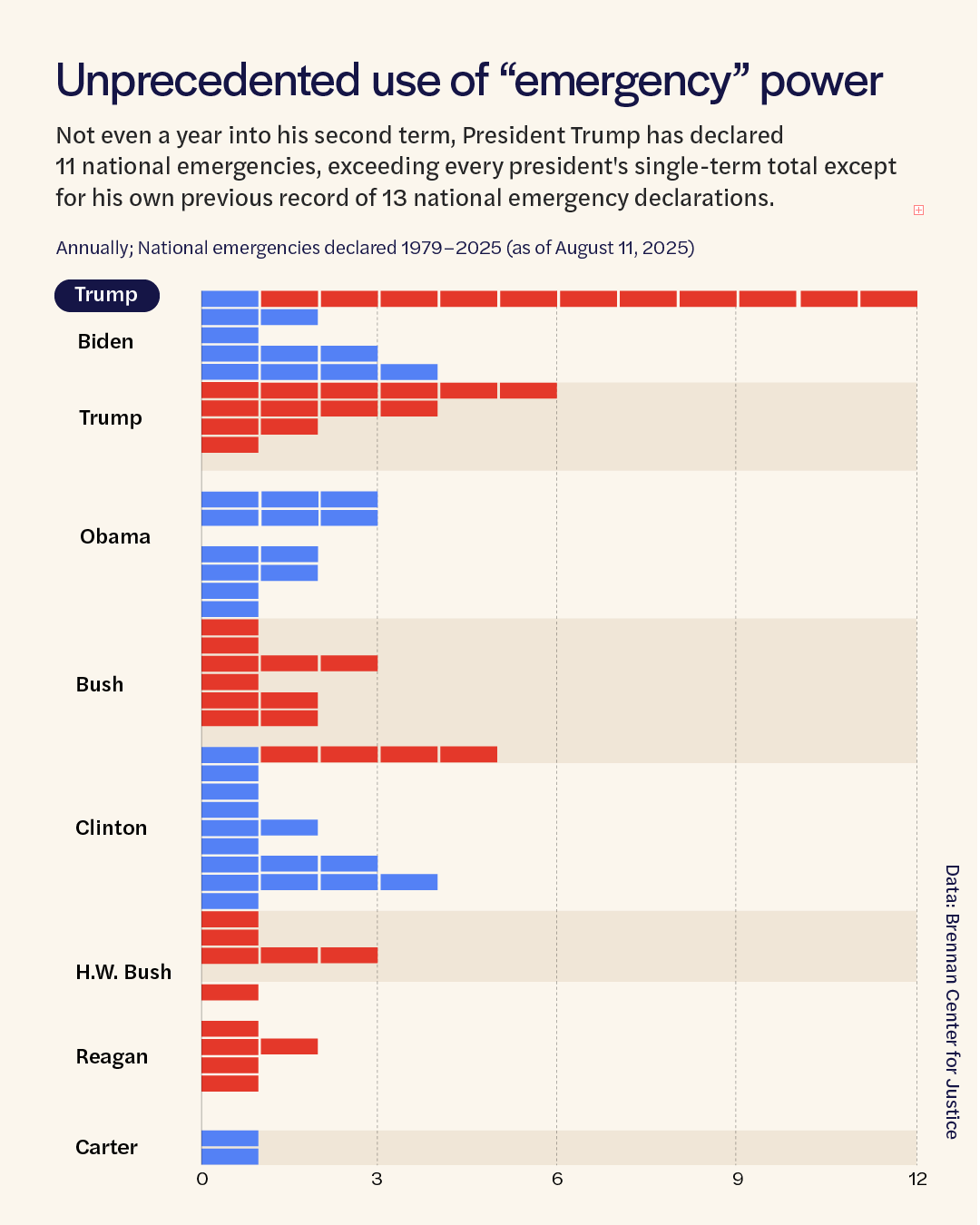Eight Key Takeaways from Trump's Political Provocation of Sending Troops to D.C.
The reality TV president is using Washington as a test case for seizing military control over cities with Democratic - and democratically elected -- mayors
By Beau Tremitiere and Emily Rodriguez/ Protect Democracy
This week, President Trump announced that he would activate the National Guard in Washington, D.C. and temporarily take control of the city’s police department. This dangerous escalation attempts to politicize law enforcement in our capital city, misuse our armed forces, and militarize our daily lives for his authoritarian agenda.
This is as a hallmark authoritarian tactic intended to silence dissenters, target vulnerable communities, coerce fealty, and ultimately entrench his power.
Here are eight things you need to know about the deployment of the National Guard to American cities and the politicization of law enforcement:
1-This is yet another example of Trump manufacturing “emergencies” to expand his own authority.
This administration has used emergency powers to an unprecedented degree. Less than a year in, the second Trump administration has declared 11 national emergencies — more than any other president’s single-term total except his own first-term record of 13.
Misusing presidential powers that were intended for real emergencies — as the president is doing here — is dangerous on two fronts: One, it undermines preparedness and ability to respond when things genuinely go wrong; and two, it gives a would-be autocrat a powerful tool for abuse.
2-Crime is just a pretext.
The president wants to instill fear. That’s why he is emphasizing dystopian scenes of crime, why he is claiming to “rescue our nation from crime, bloodshed, bedlam, and squalor and worse.”
But the reality is simple: Crime is down in Washington, D.C. While public safety is obviously still a valid and pressing concern, there’s no genuine emergency — and instead, every reason to believe this is a pretext for normalizing soldiers on the streets of American cities.
In fact, just three months ago, Trump loyalists in the administration were celebrating — and taking credit for — Washington’s progress in reducing crime.
The real effect here is three-fold: intimidating his political opponents, distracting the public from the rampant and real threats to the rule of law, and amassing ever more unchecked authority.
3-This escalation relies on a flawed interpretation of a legal loophole.
The police takeover is a misuse of the D.C. Home Rule Act, and the National Guard deployment relies on a dubious legal loophole that undermines foundational legal protections against military involvement in civilian affairs.
The Constitution makes the president the Commander-in-Chief of our armed forces, but a set of constitutional and statutory constraints are intended to prevent the chief executive from abusing this awesome power — overseas and, especially, here at home. The Posse Comitatus Act (1878) prohibits the U.S. military from participating in domestic civilian law enforcement unless expressly authorized by Congress. It does not apply to National Guard units that are under state control, which may engage in certain types of law enforcement support activities.
Unlike all other state and territorial Guards, the D.C. National Guard is never under state control — it reports at all times to the president. The administration maintains that this unique status effectively exempts the D.C. National Guard from the Posse Comitatus Act. This view has never been tested in court, nor has Congress validated it. In effect, the administration is leveraging a historical relic and a legal fiction to bypass the very constitutional protections meant to prevent this kind of military interference in civilian affairs.
4-There are important differences between the military and law enforcement.
Keeping the military out of domestic law enforcement is a foundational American principle enshrined in law to protect individual liberties and preserve democratic order.
These promised deployments are not only a violation of longstanding norms around the appropriate role of the military; they also jeopardize access to due process, increase the likelihood of the use of excessive force, and create the potential for collateral damage inflicted on the American people as a result of escalating conflict.
Consider what happened in 1992, when federal troops were deployed to Los Angeles at the governor’s request in response to riots. Joseph Nunn recounts an incident where police officers responded to a domestic violence call with Marines as backup:
One of the officers shouted to the Marines, ‘Cover me’ — a request, in law enforcement parlance, that they raise their weapons and be ready to fire if necessary. But the Marines, in accordance with their own training, took it as a request for suppressing fire. They riddled the home with more than 200 bullets. Miraculously, no one was killed.
5-There may be negative consequences from using the military for law enforcement.
The Department of Defense has stated that duties for the National Guard soldiers will be "administrative and logistical" support and providing a "physical presence in support of law enforcement." It is critical to understand what this means.
Military personnel are trained for military operations, not crowd control, de-escalation, or community policing. Federal law generally prohibits the use of the military (including the National Guard when in federal service) for civilian law enforcement purposes. They cannot make arrests, conduct searches, or investigate crimes. However, the administration has indicated that under these circumstances they are authorizing soldiers to temporarily detain people — an ambiguous power that is ripe for abuse. They will also be armed and authorized to defend themselves.
6-The administration is disrespecting the trained professionals of the National Guard by using them as political props.
In this situation, the National Guard personnel are following orders and may not personally agree with their deployment. (If you live in Washington, chances are you know someone in the Guard. They tend to be patriots and professionals. They’re very much not enforcers of a political agenda.)
When the president politicizes the military, he makes individual troops the unwilling faces of his authoritarian project and puts them in harm’s way. But National Guard personnel are not political actors, and they shouldn’t be treated like pawns. The president is responsible for his own authoritarian actions.
As former Congressman (and former Guardsman) Adam Kinzinger writes:
I served in the National Guard. I know what it means when that activation call comes in. It’s not just a change in plans for the weekend—it upends lives. Guardsmen are citizen-soldiers. They have civilian jobs, family responsibilities, and community commitments. Many are single parents who must suddenly scramble to find childcare, miss paychecks, or rely on friends and family to hold their lives together while they are away. When they answer the call for a hurricane, a wildfire, a flood, or a war zone overseas, they do it because those missions serve the public good. They put their personal lives on hold for something larger than themselves. But when they are ordered to stand on street corners in American cities to serve the political optics of a president looking to project strength and dominance, that is an abuse of their service and their oath.
Law enforcement is explicitly not what the members of the National Guard signed up for — and this sort of politicized abuse takes them away from their important roles, including national security and emergency preparedness.
7-The White House is seeking pretext for escalation.
Any violence or vandalism from residents or protesters may effectively give the administration what it is seeking.
Experts in political violence and de-escalation emphasize the importance and effectiveness of non-confrontational resistance. The most effective way to expose the brutality of a crackdown is to meet it with disciplined non-violence. Think of the organizers who intentionally planned protests away from the president’s military parade to deny him a physical flashpoint. Their peaceful mobilization forced the media and the public to confront the absurdity of a military spectacle without a real opposition to counter it. In the face of a military and police presence, a quiet and orderly protest is a far more powerful statement than a chaotic one.
The administration will seek to amplify any isolated incident of violence or vandalism to discredit their opponents writ large.
8-Washington is a test case. Trump is already setting his sights on other cities.
There’s no reason to think that the president will stop with Washington. In fact, he has signaled in his remarks that this is just a first step. As POLITICO reports:
During his wide-ranging press conference, Trump also singled out Baltimore, Chicago, Los Angeles, New York and Oakland — all of which have Black mayors and large minority populations that overwhelmingly voted against him in his three presidential runs — as crime ridden.
There are important legal differences between the president’s authority in the district and his ability to attempt to weaponize the military against other states and cities. (See point three above.)
But the threat is still clear. The administration wants to normalize soldiers and checkpoints on American streets. They want us all to accept this as a new normal. We do not believe they will succeed — because that's not, as a country, who we are.
Beau Tremitiere is Counsel & Head of the National Elections and National Security Team at Protect Democracy. Emily Rodriguez is lead communications and advocacy strategist for elections at the non-partisan non-profit. Subscribe to Protect Democracy’s newsletter here.
Additional reading:
The Authoritarian Playbook for 2025: Domestic Deployment of the Military
Not his military, by Amanda Carpenter
Sowing confusion in LA with the military, by Ariela Rosenberg, Jon Steinman, and Rebecca Lullo
How Trump Is Undermining the National Guard—and America, by Adam Kinzinger.
Image: National Guard troops in Washington D.C. on Aug. 12, 2025 (Military Times).




Hey now. These fine young youths of DC beat up ‘Big Balls’ and other staffers. People are terrified to visit the city of DC. Senators and congress people are getting accosted and hijacked in broad daylight. So what is the big problem with restoring order and safety? Apparently Mayor Bowser is incapable or unwilling to do it, and much of the crime is against the cities residents many of which are black democrats. The irony of it all.